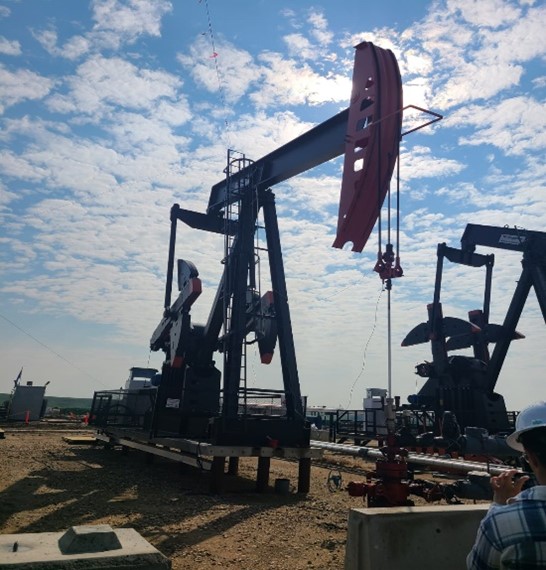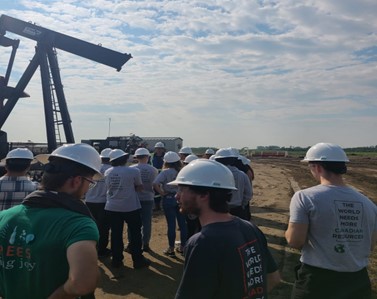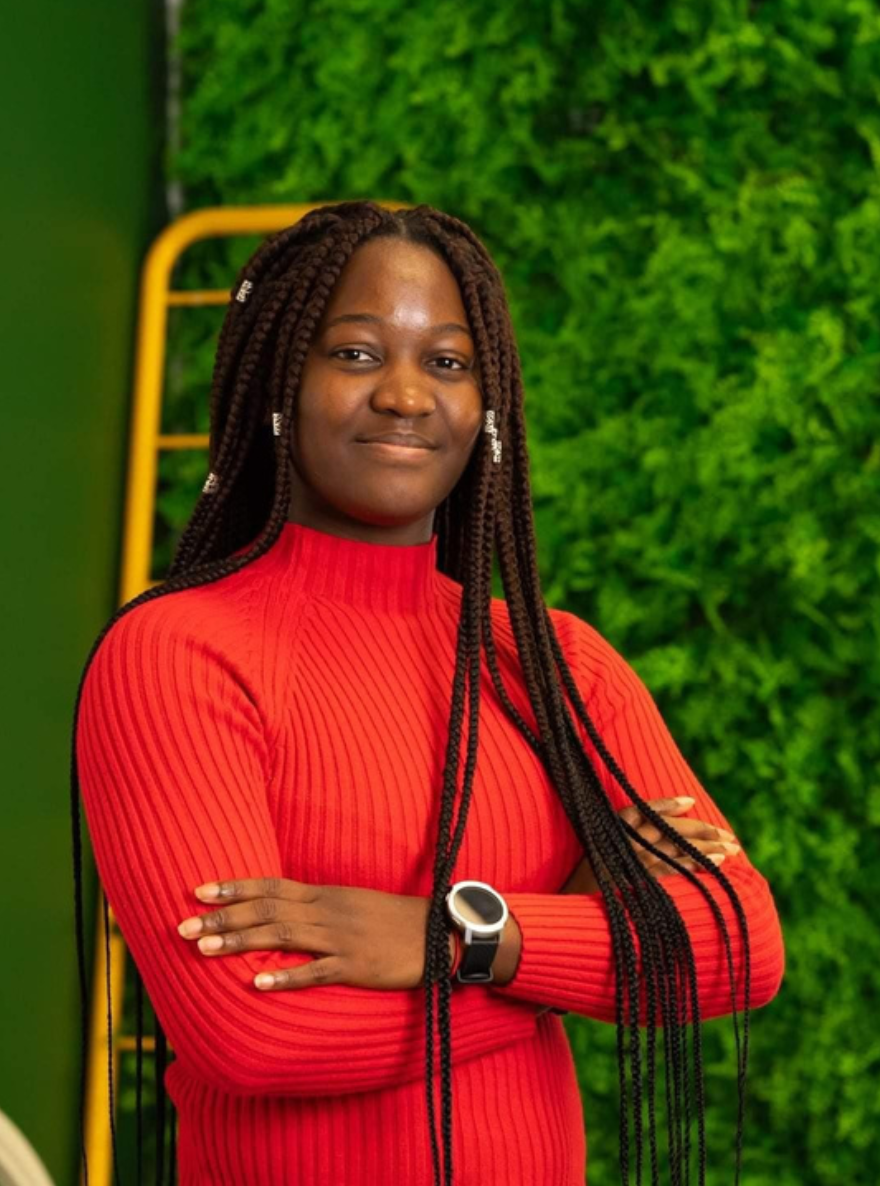Bertholeen Ngo Penda – July 26, 2023
How YCR’s Field Trip to a Well Site Reshaped My Perception of Oil & Gas
Safety First, Then Cash Flow
Last Thursday July 20th, as Young Canadians for Resources summer program members, we had the honor to visit one of Aspenleaf’s well sites. To be honest, it was a stunning experience for me. I want to admit to all young people in Canada that this experience really reshaped my perception of the oil and gas sector and how it is managed.
I grew up in Nigeria where my dad was expatriated when I was 8 years old. As you may, or may not know, Nigeria is one of the largest oil producers in the world, which is economically a great thing. Sadly, the country is not recognized for having the best practices. I grew up in a context where, oil & gas was mostly related to environmental pollution, lack of maintenance, corruption, insecurity, and social unrest.
Afterward, I moved to Québec to pursue my studies and graduated in international business and entrepreneurship from Laval University. I am still in Quebec and doing my Master’s in project management. There too, oil & gas does not have the best reputation. I can feel the increasing pressure from Sustainability movements in the province and in fact, last year, Quebec’s National Assembly voted to ban new oil and gas exploration in the province and shut down existing drill sites within three years.
As a businesswoman, when I arrived in Calgary 2 months ago, I was shocked by how big the oil & gas industry is here. But I was mainly judging the people in the industry because; why on earth would you want to be associated with all those negative outcomes from the industry? People here were proud to be working in the oil & gas industry; they were proud their parents worked in the industry. Even worse, they were proud the industry existed because it benefits them directly or indirectly.
Even if I was not actively against oil & gas and understood it was important as it provided jobs to thousands of Canadians and thousands of Nigerians; and overall provided jobs for millions of people around the world. I decided on a personal level to never have anything to do with that industry. Either because of my personal or management values or my social engagement perspectives. I was not about to imagine this field trip with Young Canadians for Resources would emotionally affect me this much. But only fools and dead men don’t change their minds, right?
Here are the most important things I learned about responsible management from this trip:
“SAFETY FIRST,
THEN CASHFLOW”
– Bryan Gould (President & CEO at Aspenleaf Energy Ltd)
1. Responsible management is a choice. Don’t blame the entire industry.
Responsible management is defined as: “improved management, targeting both the quality of the managerial act, as well as the socio-economic and environmental benefits, both local and global”. It was very insightful for me to meet Bryan Gould and hear his “management ninja way” as a CEO of an energy company. One thing he said that really marked me is: “Here is what you guys have to remember; it’s always safety first then cash flow”.
Bryan genuinely cares about his team and people in general, you hear it from them, and you can feel it. They testified that whenever a project seemed not 100% safe for the team, Bryan would not go for it; no matter how much money is implied. That just proves to me how personal management practices are. Just as much as you can’t shut down a country for having a bad leader, we shouldn’t condemn a whole industry for the bad managers in it. Especially in a context where the world still needs oil & gas; whether for our energy or for the goods we use and consume. So, it is our responsibility as a society and as consumers to encourage the business of those who have good practices like Bryan.
2. Investing in technology can help reduce emissions.

We had the chance to learn about the process of fracking while on the trip, I had a lot of prejudices against fracking as it is also a very debated and criticized environmental and political issue. Fracking is short for “hydraulic fracturing”; it’s defined as: “the process of creating fractures in rocks and rock formations by injecting specialized fluid into cracks to force them to open further. The larger fissures allow more oil and gas to flow out of the formations and into the wellbore”.
Critics claim that fracking can destroy drinking water supplies, pollute the air, contribute to the greenhouse gases that cause global warming, and trigger earthquakes.
But it was very reassuring for me to see, meet and discuss with the different professionals and experts implicated in the realization of this process. At Aspenleaf, geologists – Engineers – Soil Scientists, etc., work alongside managers and environmental specialists to ensure they have the best practices and control over the outcomes of this process. The technology implied makes the precision almost perfect, greatly limiting the risks.
3. Inclusion and collaboration are key for sustainable development.
Third, but not least, is the collaboration and inclusion of the communities in which they build pipelines. There is a real and authentic relationship between Aspenleaf and the communities, not only because they always have an upstream conversation with the community leaders before they start any project to reassure them of their practices and find common ground for efficient collaboration. Additionally, they have a real socio-economic impact in these communities that go from generating jobs to funding for building schools.
Of course, nothing is ever all green. One thing that we noticed while out there is the lack of diversity among the first-line team on this project. No women, no ethnic diversity. Is there room for improvement on the diversity and inclusion end? Absolutely.

As I am currently doing my master’s in project management, I had to ask them what their biggest challenge was in managing projects considering the temporality and novelty of the concept. The answer was that you never really know what to expect from the soil. It varies from one place to another. But “we are grateful to work with extremely smart people and have access to the technologies” that help them study and analyse the different parameters and be able to make scientific-based decisions that are sustainable for each project.
Overall, I am happy to have had this opportunity and I am extremely grateful to Aspenleaf Energy Ltd and Bryan Gould for doing us the privilege of this very educational tour. It gives me more hope in humanity as it reminds me that most people care about their socio-environmental impacts. And that it’s our responsibility, as a society, to educate ourselves, be open-minded, and work to find common ground and real balance between prosperity, people, and the planet. After this experience, I don’t see a reason anymore for me to be afraid of being an advocate of sustainable production of oil & gas. I may even open my own company and lead by example like Bryan Gould.
